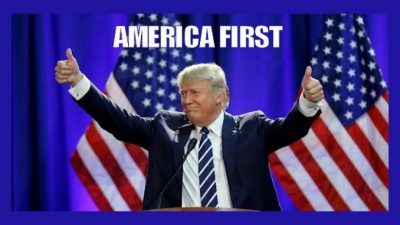Dangerous Scenario: “America First” Confronts “China First”
The art of war

President Trump disembarked from the helicopter at the World Economic Forum in Davos. Here, preceded by the brass players of the orchestra of Friborg, he announced that «The world is witnessing the resurgence of a strong and prosperous America», thanks to the tax cuts and reforms implemented by his administration on the principle of «America First», that is puting America in the first place.
This «does not mean America alone: when the United States grows, so does the world». But, he added, «we cannot have free and open trade if some countries exploit the system at the expense of others». The reference is especially clear to China and Russia, accused of «distorting global markets» through «industrial subsidies and a pervasive state-led economic planning».
The crux of the question consequently emerges. The United States is still the world leading economic power, especially thanks to the capitals they use to dominate the global financial market, the multinationals which they exploit resources with in every continent, their owned technological patents, the pervasive role of their multimedia groups influencing people’ opinions and ways on a planetary scale.
Their economic supremacy (including the dollar), however, is being increasingly endangered by new States and social actors emerging. First of all China: its gross national income rose up to the second world place after the US. China is the «factory of the world» in which also many large US groups produce. It has therefore become the world leading exporter of goods. In return, China is increasing investments both in the US and in the EU, and in Africa, Asia and Latin America (in these areas on infrastructures above all).
The most ambitious project, launched by China in 2013 and shared by Russia, is that of the New Silk Road: a land (road and rail) and maritime network connecting China to Europe through Central and Western Asia and through Russia. If the project (which does not include military components) is accomplished according to the original idea, it would reshape the geopolitical architecture of the whole Eurasia, creating a new network of economic and political relations between the States of the continent.
The globalization that United States promoted, confident of dominating it, now turns against them. The increasing of 50% on duties for washing machines and solar panels, set by the Trump administration to affect China’s and South Korea’s export, are not a sign of strength but weakness.
Losing ground on the economic globalization level, United States is focusing on military globalization: «We are making historic investments in the American military – announced Trump in Davos – because we cannot have prosperity without security».
The US already has bases and other military installations in over 70 countries, especially around Russia and China. There are more than 170 countries where US troops are deployed. European powers of NATO join in this strategy, despite having contrasts of interest with the US, and line up under US leadership when it comes to defending the economic and political order dominated by the West.
This is the scenario of the increasingly dangerous US / NATO escalation in Europe against Russia, represented as the enemy threatening us from the East. Any debate on the European Union and on the Euro ignoring this issue, means playing a game with rigged cards in front of the voters, as they do in the current electoral campaign.
Article in Italian :
«America First» armata sulle nostre teste
il manifesto, 30 January, 2018

